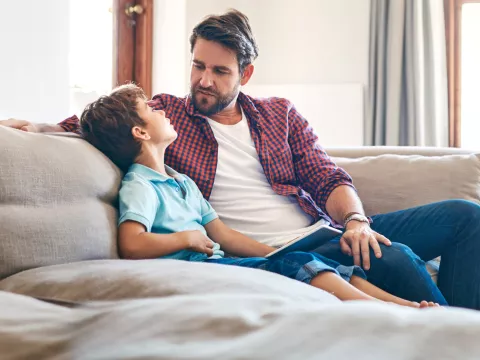- AdventHealth

Since natural disasters tend to happen without much warning, planning ahead is critical to making sure your family is ready to act quickly for the best outcome possible. While you can be proactive by creating a disaster supplies kit and forming a tornado readiness plan, knowing how to cope mentally and emotionally after a tornado hits is much harder.
Though you can’t plan for how you or your loved ones will react after such a traumatic event, there are a few strategies that can help you support one another:
Comfort Children
While disasters such as tornados can make anyone feel scared, confused and insecure, they tend to hit children the hardest. It’s vital you recognize your children’s reactions early and help them cope with their emotions:
- Answer their questions: Give age-appropriate details of what is going on. Ask them about their concerns and clarify any misunderstanding of the situation you find yourselves in.
- Be calm: Children look to you for clues on how to behave, especially in unknown situations. By remaining calm and reassuring yourself, you can help your children cope more successfully. Let them know you are following the plan just like you practiced.
- Get support: After a tornado is over, your children may need continued emotional support to cope. Friends, family, community outreaches or faith-based organizations are all excellent sources of support. Don’t be afraid to reach out for yourself or your child.
- Open a dialogue: Listen to what they’re saying, acknowledge their feelings and ask them to tell you what they are worried about. Don’t brush their concerns aside even if they seem silly to you.
- Shut off media: News coverage on TV, radio or on social media creates an atmosphere of fear, confusion and anxiety. Media constantly replays scenes of natural disasters in loops and younger children can be misled into thinking the event is still occurring even when it is over.
Understand If Your Children Are at Risk
The stress doesn’t always end when the tornado has passed. Secondary effects of a natural disaster can have lingering effects on children. Your children may be at greater risk for long-term emotional and psychological distress if they:
- Are living with ongoing stressors such as loss of home and belongings, loss of place of worship, temporary housing situations, loss of access to friends, or parents becoming unemployed
- Experienced grief, loss or injury, such as exposure to serious injury or death of a loved one or friend
- Had direct exposure to the tornado, such as being injured or seeing others injured
Be Patient With Your Loved Ones
It’s important to acknowledge that we all handle adversities in our own unique ways. While some are emotionally strong, others may be overwhelmed or feel ill-equipped to deal with the stresses they’re suddenly facing. Try to show each family member more grace during such a natural disaster. And together, you can walk through the experience and lean on one another for emotional and spiritual support.
Focus on Your Whole Health
Tornados can literally turn your world upside down without warning, filling you with doubt, confusion and even anger. If you need someone to talk to who can help you cope emotionally in the aftermath, reach out to one of our providers. Our team can help support you in body, mind and spirit as you heal.


